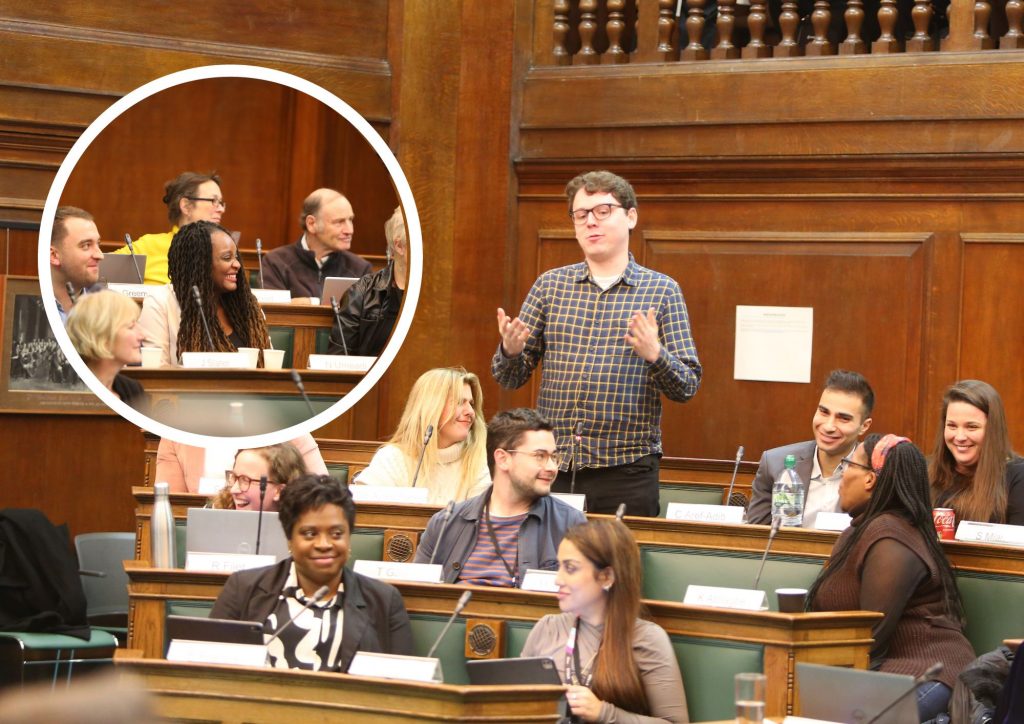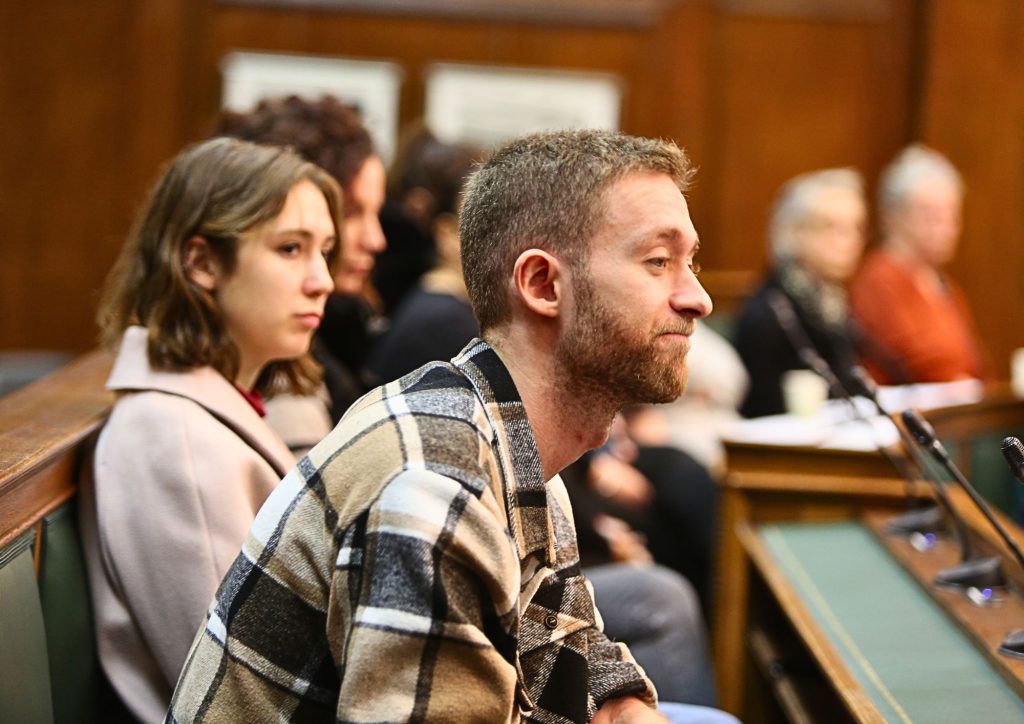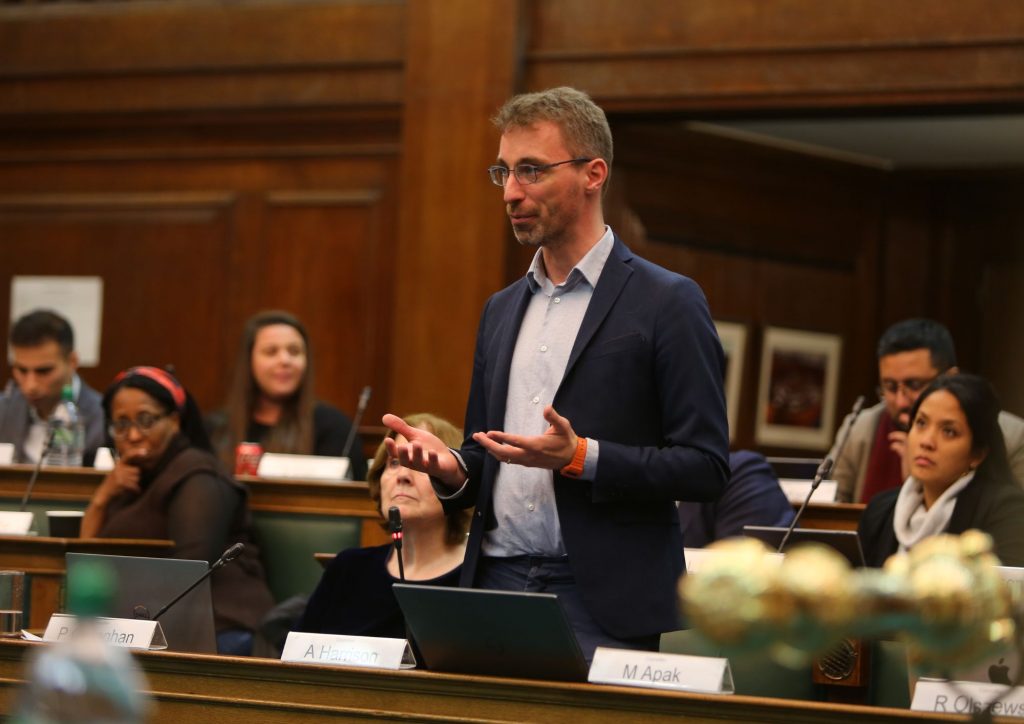Ready to give up your chicken and chips? Council is urged to go meat-free to help save the planet
Lentils can be cheaper if you 'batch cook', councillors told
Tuesday, 21st November 2023 — By Richard Osley

Sam Ebner-Landy and Plant Based Councils campaigners in the Town Hall chamber
THE Town Hall was last night (Monday) urged to drop cow’s milk in its tea rounds and to stop serving ham sandwiches in meetings as climate change campaigners warned the meat and dairy industries are compounding the climate crisis.
For the second time this year, councillors were asked to move to plant based food for its meetings and events, as deputees in the council chamber held up a green and yellow flag.
Sam Ebner-Landy, who lives in South Hampstead, told the meeting: “Not only will this reduce the council’s emissions enormously, prevent deforestation and reduce wastage of water, it will also encourage residents to take up plant based eating habits themselves.”
When the issue was discussed by members in February, the question of cost came up and a warning that families struggle with the prices of plant-based options.
Labour councillor Nanouche Umeadi had said then: “I think your point doesn’t take into consideration how expensive it can be to be only be plant based. Buying oat milk is more expensive than buying cow’s milk… It’s the middle of a cost of living crisis – it is cheaper to eat chicken and chips. That’s £1.99 or £2.50, compared to a healthy veggie meal that costs more to buy fruit and veg.”
Last night, her fellow Labour councillor Matt Cooper – who said he had been a vegetarian for 12 years – appeared to recall these comments when he asked Mr Ebner-Landy: “How do I go about convincing my friends to give up their chicken and chips and have a better lifestyle? Because I think that’s one of the biggest blockages is. A lot of people want to carry on eating meat still.”

Labour councillor Matt Cooper makes his colleague Nanouche Umeadi, inset circle, laugh with a barely-disguised reference to her comments earlier this year
Mr Ebner-Landy told the meeting that plant-based diets did not need to break the bank.
“I think the key issue is in costs,” he said. “Now, if we look at the most available proteins, we look basically at lentils versus chicken. These are things that are all close to our hearts. Lentils can provide much more protein than the cheapest protein in the meat farming industry, which is chicken, and it is much, much cheaper if you’re batch cooking. There are many, many versions of a plant based diet that can be much cheaper in the long run.”
He added: “We all know you can go to McDonald’s and have a 99p burger, you could also go to a fancy steak restaurant and get Wagyu beef for £30, £40. There are many different price points in our diet. Cost is really essential and, of course, I think about that as well but personally, I found when I made the switch from an animal based diet to a plant based diet it didn’t affect me at all.”
In his main speech, he warned that the emissions caused by meat and dairy industries were too costly to the environment.
“Per calorie and gram of protein produced, meat and dairy produce many times more emissions than plant foods,” he told councillors.
“In July, Oxford University published their findings on the environmental impact of different diets. The least sustainable plant-based diet was more environmentally friendly than the most sustainable meat-eaters diets in terms of emissions, water and land use. What’s more, animal farming and fishing are the primary causes of biodiversity loss globally.
“On the council’s own website, residents are told that the number one thing they can do to cut CO2 emissions is to ‘eat less meat and dairy produce’. The 2021 ReLondon report states that if Londoners reduce their meat intake by 70 per cent, it would cut London’s consumption-based emissions by 20 per cent.”

Sam Ebner-Landy lead the deputation
Later, answering a question as to why little had change since the last time campaigners had raised the issue in the council chamber, Mr Ebner-Landy said: “We all know that social change can be very slow and ultimately, we have to look at this as a crucial moment in our history where, in order to sustain our children and grandchildren’s future, we can make decisions now. There are, of course, going to be ways that our progress is slowed by people hanging onto things that may be going to be in the past, but I truly believe that this is essential for our development as a species if we all want to secure our future.”

Labour councillor Adam Harrison, Camden’s environment chief
Camden’s environment chief Councillor Adam Harrison said: “We recognise the major impact that food has on the climate crisis and our own research shows that for around 11 per cent of households in Camden their consumption based emissions are attributable to food and drink, and meat is a huge portion of that. So it’s a really important factor and one we need to make progress on. It is also a core part of the food mission that we’re undertaking as a council, looking right across the piece. By 2030, the goal is that everybody should be eating well every day, with nutritious, affordable and sustainable diets. That’s what we’re aiming for and that’s really important part of our wider climate action plan, which we adopted in 2020.
He aded: “We’ve taken a number of steps to address this and support this ambition. As a council, we don’t directly provide a huge amount of food, but in our cafe in our 5 Pancras Square building, for example, we provide a range of plant-based meals for staff and that was part of letting that contract. Similarly, through some of the events that we run, we make sure that we’re targeting around 50 per cent plant-based options from suppliers. All sustainability-based events have either vegan or vegetarian food by default.”
